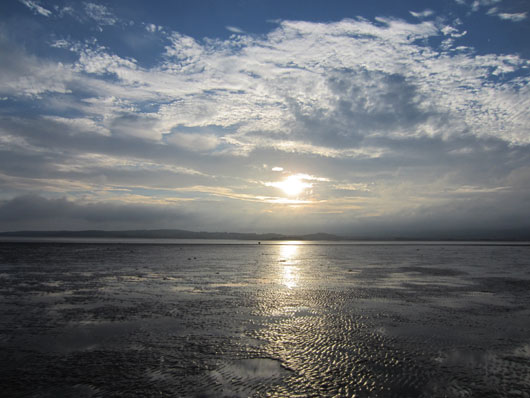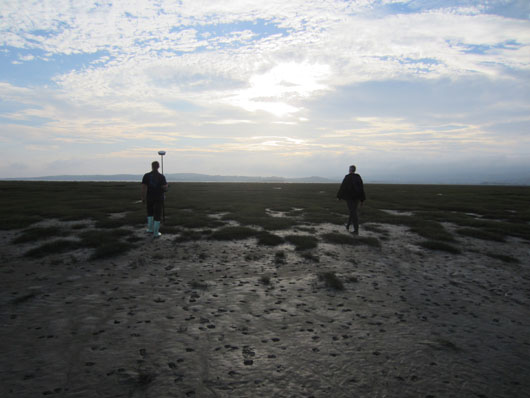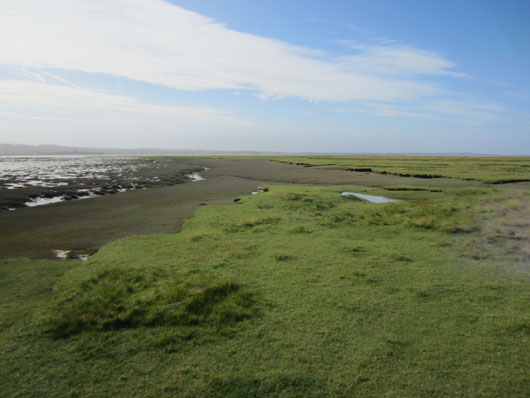Morcambe and Wiser

Scientists are heading to the unlikely location of Morcambe to find out more about the effects of climate change.
A group led by the University of St Andrews will take to the northwest coastline of England this month to investigate the increasing demands placed upon nature by a growing population.
The scientists say that society must find a way of managing land better if we are to continue to benefit from nature’s helping hand.
The team will look at natural systems, such as mudflats, and their role in benefits such as the purification of water, the production of food and the protection of coastlines, as well as the provision of habitat for wildlife and recreational space for humans.
The research team will study sites at West Plain, Cartmel Sands and Warton Sands this week (3 – 9 February) and then again for a week from Saturday 16 February.
The initiative is part of a six year NERC-funded programme involving 14 research institutions and led by the University of St Andrews.

The University’s Professor David Paterson is the Consortium Leader for the project. He said, “The natural systems that underpin the delivery of nature’s services that society enjoys, such as clean water, food and protection from flooding, are being increasingly challenged by climate change and the need to feed a rapidly growing planet.
“Our landscapes need to be managed correctly to ensure that society continues to benefit from nature’s services in the future. If we are to continue to benefit from these services, we need to understand the links between the diversity of microbes, plants and animals and the services that they provide.
“The mud flats and salt marshes of the Bay are internationally important wetland sites, but also important for the communities that live in the area. The Bay supports industry, provides resources and offers many opportunities for recreation and tourism, and it is this relationship, between nature and people, that we are interested in.”
Morecambe Bay lies across the counties of Lancashire and Cumbria, a few miles south of the Lake District. Over 120 square miles of sand are revealed when the tide goes out, making it the largest continuous intertidal area in Britain. On the east and north of the Bay, the sand flats are bordered by extensive areas of salt marsh, only ever covered by the very highest tides. The Bay is rich in breeding birds, but its real importance is as a wintering and passage area for waders and wildfowl.
The data collected will be used to establish why a diverse population of microbes, plants and animals is important in the provision of natural services.
Professor Paterson continued, “At the moment, we know that biodiversity is important, but we do not know how much biodiversity is needed, or how it all works at whole landscape scales, such as an entire mudflat or salt marsh location.
“To safeguard these areas we need to understand the link between the ecosystem functions that microbes, plants and animals carry out and the ecosystem services that mudflats and salt marshes provide.”
The Morcambe study follows the team’s recent trip to the Essex marshes. Further studies will be undertaken in Wales, Scotland and Northern Ireland.
Professor Paterson continued, “It is very important to understand the value of the varied habitats that make up the landscape of the UK.
“Some of the most sensitive to the pressures of climate change are coastal systems. Our group will focus on understanding how microbes, plants and animals that live in threatened habitats contribute to our natural environment, economy and society.”

ENDS
Note to Editors
Prof David Paterson is available on 07769955264.
Or contact Meriem Kayoueche-Reeve (CBESS Project Officer) on +44 (0)1334 463613
The study is part of a six year programme funded by NERC (National Environment Research Council) in 2011 called BESS (Biodiversity & Ecosystem Service Sustainability). BESS is made up of four research consortia which aim to understand these links in urban, coastal, lowland agricultural and upland river environments.
CBESS (Coastal Biodiversity & Ecosystem Service Sustainability) is a consortium made up of 14 research institutions, universities and organisations that is concerned with the welfare and management of coastal systems.
Note to Picture Editors
Images from previous field trips are available from the Press Office – contacts below.
Issued by the Press Office, University of St Andrews
Contact Gayle Cook on 01334 467227, 07900 050 103, email [email protected]
Ref: Morcambe and wiser 050213
Follow St Andrews news on Twitter
Like on Facebook
Category Research